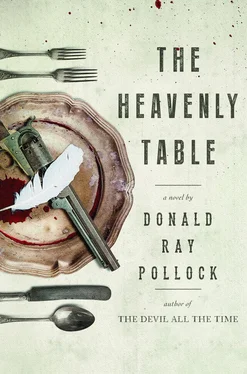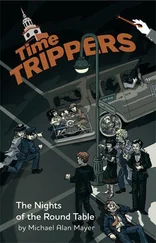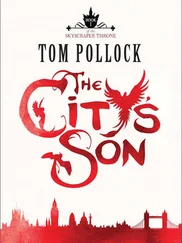“Well, I didn’t hear no shots,” Chimney said when Cane returned to the barn. “What’d ye do, strangle ’em or slit their throats?” A lantern had been lit, and he was standing next to one of the thoroughbreds showing Cob how to cinch the girth straps on the saddle.
“I went all over,” Cane said, “but they ain’t there.”
Chimney stopped and studied his brother for a moment. Satisfied that he was telling the truth, he spat and said, “Ah, they probably out fucking somewhere, knowin’ them two whores.”
Spreading the coat out on the floor, Cane began passing out the supplies for them to stick into their saddlebags. As he handed Cob the ham, he cleared his throat and said, “I owe you an apology, brother. I should have been the one killed him. It’s my fault you got your hands bloody.”
“Aw, don’t worry about it,” Chimney said. “Hell, even ol’ Bloody Bill fucked up a time or two, right?” He threw a saddle on the Arabian and reached under its belly for one of the straps. “But I reckon it’s a good thing we had Cob backing us up. Jesus, I still can’t get over it. Him a-snorin’ one minute and then BAM! Talk about blowin’ somebody’s brains out. He’s a goddamn natural, that’s what he is.”
“Well, anyway,” Cane said, “it won’t happen again. I guarantee both of ye that.”
Cob didn’t say anything. In fact, it is doubtful that he heard a word that was being said, for he was now holding a ham the size of a newborn infant. It was like something he’d imagine you’d find on the heavenly table, in between the roast beef and the spare ribs, but instead it was right here, in his dirty hands. He had heard Pearl talk about sin and gluttony and false riches enough to know he should toss it to the ground and stomp it, but, shit, what would be the sense of doing that now? He had just killed a man. He was going to hell anyway. Raising it up to his mouth, he tore a big hunk off with his teeth and began to chew.
“Jesus,” Chimney said, prying the ham loose from Cob and sticking it in a saddlebag, “what do ye think you’re doing? You just puked your guts out.”
Cane looked over at them as he lifted himself onto the other thoroughbred. “Come on, boys, this ain’t no time to be fuckin’ around.”
“How long you think ’fore they catch us?” Cob asked.
“Pretty damn soon if we don’t get to moving.”
When they came out to the main road, they stopped and looked behind them. It was only then that Cane, with just a corner of the barn’s pine-shingled roof visible in the moonlight, realized they should have brought Tardweller with them, hid his body where no one would ever find it. For a moment, he considered turning back, but quickly dismissed the idea. He told himself that at least this way the man’s wife could give him a proper burial, though the real reason wasn’t quite so compassionate. In truth, he wasn’t sure he could handle looking at it again. “Well, brothers,” he said, “ain’t nothing ever gonna be the same now.”
“That’s for goddamn sure,” said Chimney, then he gouged his horse in the flanks and the others followed. Moving northward at a canter, the hooves of the animals pounding against the hard-packed earth, the enormity of their crime slowly began to pale in contrast to the feeling of freedom that grew inside them with each passing mile. From time to time they saw a midnight lamp glowing like a tiny star in a distant farmhouse or settlement, but met nobody on the dark strip of road. Finally, just before dawn a mile or so outside of Farleigh, their bodies aching and the insides of their thighs rubbed raw from riding and the horses slathered with foamy sweat, they cut off into a woods where they found a shallow, rocky creek. They took their first bath in over a year, then sat naked in the soft, green grass under a sycamore tree and ate most of the ham and bread while the horses gazed at them stupidly.
“Heck, this is a regular picnic,” Chimney said, stretching out his skinny legs and wiggling his toes. “Just think, this time yesterday, we was gaggin’ down another one of them damn biscuits and gettin’ ready to go cut brush.”
Cane got up and went to his horse. He came back with the three shirts he had stolen, handed each of his brothers one. “I don’t reckon they’ll fit, but at least they’re clean.”
“You know,” Chimney said, “it was almost like he was a-waitin’ on us.”
“Well, that’s the trouble with owning property,” Cane replied. “A man can’t sleep at night for worrying about it.” He finished buttoning his new shirt, then picked up the frock coat and shook the dust off it.
Cob wiped his greasy fingers on his hairy belly, then tore another piece off the ham. “Wonder what Pap’s doin’ right about now?” he said.
“Probably the same thing the Major’s doing,” Chimney said.
“What’s that?”
Chimney smiled as he reached for his grimy overalls. “Standin’ at the gate, getting ready to meet his Maker.”
LIEUTENANT VINCENT BOVARD of the newly formed 343rd Machine Gun Battalion stepped out onto the porch of the long, low building he shared with two dozen other junior officers at Camp Pritchard. He had just finished another pile of asinine paperwork, and was looking forward to his first smoke of the day. It was still morning, but already the August sun was beating down upon the flat, treeless army base with the same harsh relentlessness that Colonel Garland Pritchard, the obscure, half-crazed Union commander for whom the camp was named, had led his guerrilla forces across the South in the shadow of Sherman’s great march to the sea, supposedly doing cleanup, but mostly taking potshots at anything that had been lucky enough to survive. Settling into a rattan chair, Bovard looked about with satisfaction. Though the construction was still going on from sunrise to sunset, the sweltering air filled with the sounds of hammering and sawing, the cantonment already resembled a well-designed town. And to think that just a couple of months ago there had been nothing here but cornfields and cow patties. Being even a small part of such a vast operation was something to be proud of.
For a brief moment, though, as he sat in his scratchy uniform listening to the racket going on around him, Bovard almost wished he was sipping a glass of ice tea at the Sandcastle Inn on the breezy Atlantic seashore, or lying in a shady hammock at his parents’ summer cottage in the Adirondacks. But then he heard Sergeant Malone’s hoarse voice in the distance screaming obscenities at a couple of unlucky privates. No, he reminded himself, this was exactly where he wanted to be, among men preparing to go to war. The old life of soft, mindless pleasures was over with. From here on out, he would take his comforts in the mess halls and barracks and trenches smelling of sweat and burned coffee and gun grease. It was his destiny, he could see that as clearly as he had seen anything in his twenty-two years of living.
Even so, it had taken him several weeks to get used to Camp Pritchard. At six foot two, with wavy brown hair and sea-green eyes flecked with tiny blue deposits and a perfectly straight nose passed down from his great-grandfather, a minor French aristocrat who had been lucky enough to escape to America with his head during the Reign of Terror, Bovard stood out among the crude Midwestern farmers and store clerks and mill hands that made up the bulk of the camp’s troops like a polished stone sitting atop a pile of coal clinkers. A large part of his initial problem with handling the harsh realities of camp life was owing to his education. Trained in classics, he had entered the military with abnormally high expectations, but unfortunately, the men he had encountered so far were a far cry from the muscle-bound sackers of Troy or the disciplined defenders of Sparta that he had been infatuated with since the age of twelve. Still, even though the draftees had been a sore disappointment, both physically and mentally, he had quickly learned to deal with them. It was simply a matter of lowering one’s standards to fit the circumstances. After all, how could one expect any of these poor, awkward, illiterate brutes to have even heard of Cicero or Tacitus when at least half of them had difficulty comprehending a simple order? In just a matter of days, he went from trying to form a Latin reading club to thinking that a lowly private who still had most of his teeth and could name the presidents was practically a paragon of good breeding and sophistication.
Читать дальше












